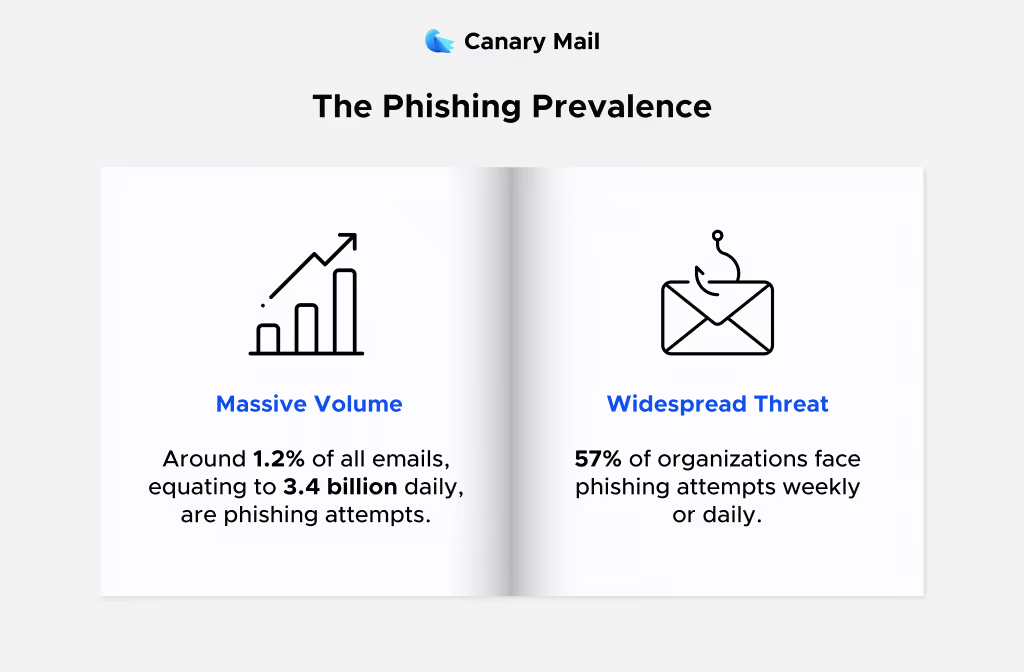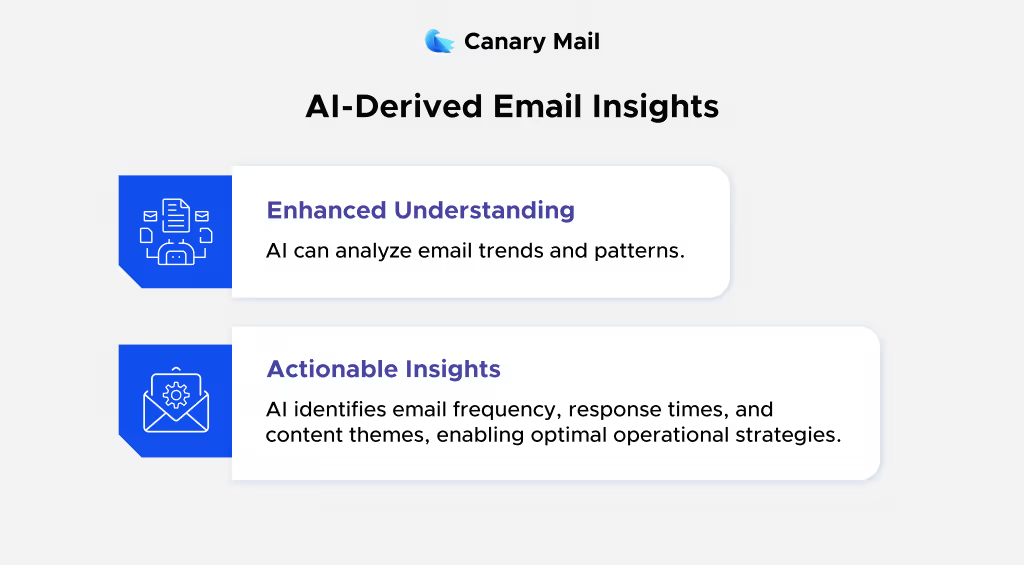Despite the rise of instant messaging apps and collaboration platforms—such as Slack, Skype, Google Workspace, and what have you—email remains a cornerstone of digital communication.
In fact, the number of global email users amounted to 4.37 billion in 2023 and is set to grow to 4.89 billion users by 2027. A staggering 361 billion emails are sent and received each day.
These numbers underscore email’s unwavering significance in both our personal and professional lives. And now, artificial intelligence (AI) is taking center stage in all things digital, including email.
Of course, AI in email isn’t novel—think text autocomplete suggestions while drafting a reply on Gmail i.e. AI-powered predictive text—has existed for years.
However, with recent advances in generative AI and natural language processing (NLP), the future of email is shaping up to be impressively streamlined, enabling more contextually aware and personalized interactions that extend beyond simple predictions, along with new features for easier inbox management.
In this post, we will delve into some expected advancements in email technology, looking particularly at how AI is set to redefine email interactions, security, and user experience.
AI-Driven Personalization and Automation
AI is revolutionizing email management by introducing unprecedented levels of personalization and automation.
Through advanced machine learning algorithms, AI can analyze email content and adapt to your specific usage behaviors to tailor drafts and prioritize messages. It can automatically categorize messages, floating urgent emails from key contacts to the top of your inbox, while less critical ones, such as branded promos, are neatly tucked away in separate tabs for later review. This ensures you never miss important emails and can swiftly tackle routine communications.
The best AI email assistants leverage NLP to offer templated replies that require minimal edits from you, speeding up your response time. They analyze past interactions to craft responses that match the tone, style, and urgency needed for each conversation. It can also summarize long emails so you can quickly get the gist and take action.
Furthermore, AI enhances email scheduling by predicting optimal send times, increasing the likelihood that messages are read and replied to promptly.
Overall, AI-driven automation can enhance your focus and efficiency, turning email management from a chore into a more passive yet effective activity. Through AI, your emails become not only timely but also contextually appropriate, fostering stronger connections and ensuring your communications are consistently on point.
Enhanced Security Measures
Did you know that 57% of organizations fall prey to email phishing attempts on a weekly or daily basis? What’s more, roughly 1.2% of all emails sent are malicious, amounting to over 3.4 billion phishing emails each day.

These statistics shed light on how email remains a prime target for cyber threats. On the bright side, the integration of AI into email marks a significant advancement in email security.
AI tools implement sophisticated algorithms to detect patterns indicative of phishing attempts and other cyber threats. By analyzing the behavior and metadata of incoming emails, AI can identify and block sophisticated scams before they reach you, the recipient.
Furthermore, AI-based advancements in spam filtering technology means these systems are now capable of understanding the context and intent behind messages, significantly improving the detection of spam and malicious content. This not only protects you from unwanted emails but also helps in maintaining the integrity of sensitive data.
With the introduction of biometric security in modern AI email assistants, emails are now protected through fingerprint or facial recognition as well as two-factor authentication (2FA), providing a layer of security that is unique to you. Additionally, advanced end-to-end encryption protocols ensure that your email data is safeguarded against unauthorized access and interception.
Even with robust biometric and multi-factor security for your accounts, the information about you that exists publicly on the internet can still be used for identity fraud. Using a digital footprint scanner from Aura can help you gain control over your online presence and proactively manage the personal information that is publicly exposed.
Privacy and data protection are also enhanced by AI, ensuring that data handling complies with global standards such as GDPR and HIPAA, providing you with transparency and control over your personal information.
For instance, Canary Mail, equipped with sophisticated AI, enhances email security through end-to-end PGP Encryption & SecureSend, ensuring your communications remain private and protected from eavesdropping. It also integrates Vade Secure to prevent misdirection and thwart phishing attempts effectively. Compliant with stringent privacy standards like HIPAA, GDPR, and Google's Limited Use Requirements, Canary Mail stands out as a reliable choice for managing emails safely.
All in all, these advancements in email security are transforming how we protect and manage our digital communications, making them safer and more reliable than ever.
Cleaner User Interfaces and Integration
AI is set to boost your email efficiency by coupling smart automation features with better design, thus holistically improving your interactions with email applications.
With cleaner user interfaces, AI will anticipate your actions and streamline processes such as searching, sorting, and organizing emails. This could, for instance, mean AI suggesting you to file certain messages into specific folders or highlighting emails that need your urgent attention based on your past behavior. This means you’ll spend less time managing your inbox and more time focusing on what truly matters, making your email experience smoother and more intuitive.
AI will also streamline mundane tasks like tracking follow-ups and reading receipts within the interface itself, making your interactions with your email app faster and easier.
Moreover, AI is transforming how email applications integrate with other digital tools like CRMs, customer support software, and internal communication platforms. This enhanced integration allows for seamless workflows, where actions taken in one platform automatically update related data across others.
For example, an email flagged in your inbox could trigger a task creation in your project management tool or update a customer record in your CRM. This interconnectedness ensures that information is consistent and accessible across all platforms, reducing the need for manual data entry and increasing overall efficiency.
Data-Driven Insights and Analytics
Consider this: every email you send or receive can help improve your business. AI can analyze general trends and patterns from your business emails to capture valuable and actionable insights.
Taking into account various parameters like email frequency, response times, and content themes, AI can pinpoint trends that paint a picture of your operations, shown with embedded analytics platforms.

For example, if multiple prospects ask similar questions about your agency’s service, AI can highlight this pattern. You could then update your service page description to clarify what your service exactly entails, thus enhancing UX for future clients and reducing time spent answering redundant questions.
Additionally, predictive analytics powered by AI will revamp how businesses interact with customers and plan marketing strategies. By analyzing historical data and current email interactions, AI can forecast customer behaviors and preferences. This allows you to anticipate customer needs and tailor your communication strategies effectively.
For instance, AI can predict when a particular customer segment is most likely to engage with emails, helping marketers optimize send times and personalize content to increase open rates and conversions. This can not only boost marketing effectiveness but also enhance the overall customer experience by delivering timely and relevant interactions.
Wrapping Up
As we look to the future, email is set to become even more intuitive and secure, thanks to advancements in AI. From enhancing personalization and automation in our daily communications to strengthening security measures and integrating seamlessly with other digital tools, the next iteration of email will transform how we connect and collaborate.
Ready to experience the future of email today?
Try Canary Mail for free and see how it can optimize your email efficiency with cutting-edge AI capabilities.
FAQs
How will AI change the way we manage emails?
AI will dramatically streamline email management by automating routine tasks like sorting and prioritizing emails based on user behavior and content relevance. It will enable quicker and better responses and enhance user efficiency, allowing for more focused work on substantive tasks rather than managing inbox clutter.
What security advancements can we expect in future email systems?
Future email systems will likely incorporate advanced encryption protocols, biometric security measures, and AI-driven threat detection algorithms to enhance security. These technologies will provide robust defenses against phishing, malware, and unauthorized access, ensuring data integrity and user privacy.
Will emails become more interactive in the future?
Yes, emails are expected to become more interactive, incorporating elements like embedded widgets, shared inboxes, tasks creation and delegation, and dynamic content that users can interact with directly within the email environment. This will make emails not just a tool for communication but a platform for engagement and productivity.
How will email integration with other tools evolve?
Email integration with other business tools will become more seamless, enabling data and functionality to flow freely between systems. This will support more cohesive workflows and data-driven decision-making, as emails can trigger actions in CRM systems, project management tools, and more.
What are the potential challenges with the future developments of email?
As email technology advances, challenges such as data privacy, over-reliance on automation, and maintaining the human touch in communications will become prominent. Navigating these challenges will require careful consideration of ethical standards and user-centric design to ensure that advances enhance user experience without compromising personal interaction.